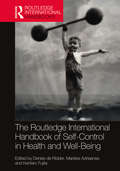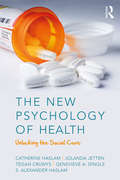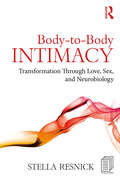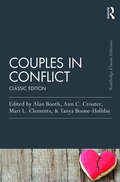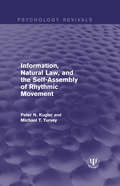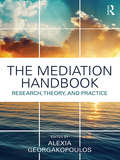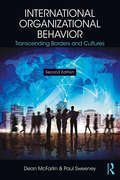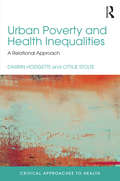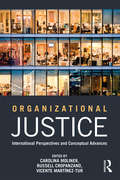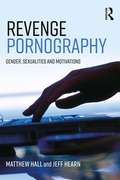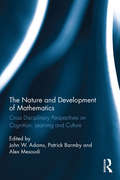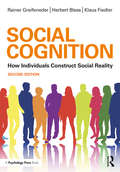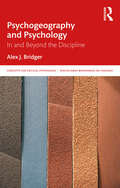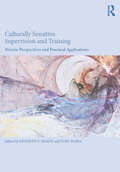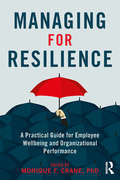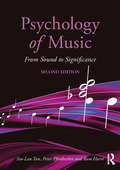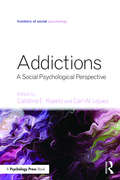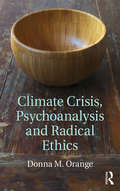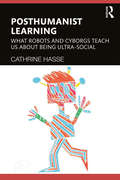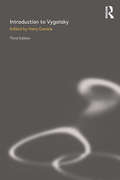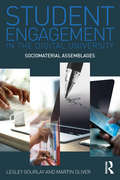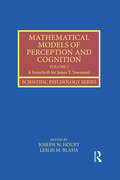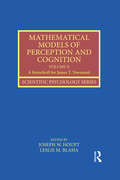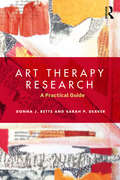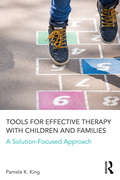- Table View
- List View
Routledge International Handbook of Self-Control in Health and Well-Being (Routledge International Handbooks)
by Denise De Ridder Marieke Adriaanse Kentaro FujitaThe ability to prioritise long-term goals above short-term gratifications is crucial to living a healthy and happy life. We are bombarded with temptations, whether from fast-food or faster technologies, but the psychological capacity to manage our lives within such a challenging environment has far-reaching implications for the well-being not only of the individual, but also society as a whole. The Routledge International Handbook of Self-Control in Health and Wellbeing is the first comprehensive handbook to map this burgeoning area of research by applying it to health outcomes and personal well-being. Including contributions from leading scholars worldwide, the book incorporates new research findings that suggest that simply inhibiting our immediate impulses isn’t the whole story; there may be more options to improve self-control than simply by suppressing the ego. Divided into six coherent sections, the book provides an overview of the research base before discussing a range of interventions to help improve self-control in different contexts, from smoking or drinking too much to developing self-control over aggression or spending money. The only definitive handbook on this far-reaching topic, this essential work will appeal to researchers and students across health and social psychology, as well as related health sciences.
The New Psychology of Health: Unlocking the Social Cure
by Catherine Haslam Jolanda Jetten Tegan Cruwys Genevieve Dingle Alex HaslamWhy do people who are more socially connected live longer and have better health than those who are socially isolated? Why are social ties at least as good for your health as not smoking, having a good diet, and taking regular exercise? Why is treatment more effective when there is an alliance between therapist and client? Until now, researchers and practitioners have lacked a strong theoretical foundation for answering such questions. This ground-breaking book fills this gap by showing how social identity processes are key to understanding and effectively managing a broad range of health-related problems. Integrating a wealth of evidence that the authors and colleagues around the world have built up over the last decade, The New Psychology of Health provides a powerful framework for reconceptualising the psychological dimensions of a range of conditions – including stress, trauma, ageing, depression, addiction, eating behaviour, brain injury, and pain. Alongside reviews of current approaches to these various issues, each chapter provides an in-depth analysis of the ways in which theory and practice can be enriched by attention to social identity processes. Here the authors show not only how an array of social and structural factors shape health outcomes through their impact on group life, but also how this analysis can be harnessed to promote the delivery of ‘social cures’ in a range of fields. This is a must-have volume for service providers, practitioners, students, and researchers working in a wide range of disciplines and fields, and will also be essential reading for anyone whose goal it is to improve the health and well-being of people and communities in their care.
Body-to-Body Intimacy: Transformation Through Love, Sex, and Neurobiology
by Stella ResnickThis book presents an integrative, growth-oriented approach to therapy with couples that demonstrates the dynamic interplay between partners’ emotional issues and their sexual difficulties. It offers a model for relational and sexual enhancement that focuses as much on partners’ present, nonverbal body-to-body communications as on their words. Dr. Stella Resnick draws on research from interpersonal neurobiology, sexology, positive psychology, and Gestalt therapy, and shares a rich assortment of therapy vignettes to demonstrate the transformative power of pleasure and how a focus on body-to-body intimacy can heal emotional wounds from the past and encourage greater presence, empathy, authenticity, playfulness, and sexual pleasure between intimate partners. The therapeutic process is explored in four related spectrums: the Problem-Transformation Spectrum, the Attachment-Sexuality Spectrum, the Pain-Pleasure Spectrum, and the Cognitive-Somatic-Experiential-Behavioral-Spectrum. Part I lays the theoretical foundation for the work. Part II examines the early attachment bond between parent and child and its effects on adult capacity for emotional closeness and sexual pleasure. Part III offers methods for resolving painful emotional issues underlying many sexual difficulties. Finally, Part IV describes the procedure for moving from a cognitive reframing of the problem to a somatic focus on the body and tracking present-moment emotional interactions to the repair of relational injuries that nurture transformational change. Also included is a series of process-oriented exercises and a handout that therapists can use in their own practice. Body-to-Body Intimacy will enable couples and sex therapists to expand their practices and enrich their clients’ sexual and relational dynamics. This book also contains valuable information that will be appreciated by anyone interested in a greater understanding of a growth-oriented therapeutic process for couples and what can be achieved together by gaining a deeply loving and sexually fulfilling intimate love relationship.
Couples in Conflict: Classic Edition (Psychology Press & Routledge Classic Editions)
by Alan Booth Ann C. Crouter Mari L. Clements Tanya Boone-HolladayThis classic volume provides a solid foundation for thinking about creative ways in which our society can work to prevent or minimize destructive couple conflict and enhance couples' abilities to constructively handle their differences. A common thread throughout is that constructive conflict and negotiation are beneficial for relationships. The new introduction provides an overview of how this classic text is still relevant today. Divided into four parts, this book: *addresses the societal and bio-evolutionary underpinnings of couple conflict; *presents the interpersonal roots of couple conflict and the consequences for individuals and couples; *discusses what effects couple conflict have on children and how individual differences in children moderate these effects; *outlines policies and programs that address couple conflict; and * concludes with an essay that pulls these four themes together and points to new directions for research and program efforts. This book serves as a supplement in graduate or advanced undergraduate courses on interpersonal relationships, couples and/or family and conflict, divorce, couples and/or family therapy taught in human development and family studies, clinical or counseling psychology, social work, sociology, and communications and it is also a helpful compendium for researchers and clinicians/counselors interested in couple conflict.
Information, Natural Law, and the Self-Assembly of Rhythmic Movement (Psychology Revivals)
by Peter N. Kugler Michael T. TurveyOriginally published in 1987, the introduction states: "the authors have successfully accomplished their program – to explain, based on physical representations, the observed relations among various parameters of wrist-pendulum oscillations. Thereby a set of new ideas and concepts, including those developed recently by the scientific school to which the authors belong, are introduced to biology. These concepts are closely related to the experimental data. This accomplishment makes the book especially attractive and demonstrates once more the productivity of applying physics to biology." "Clear language, simple figures, and physical examples illuminate rather complicated problems. These attractive features should make the book intelligible to a variety of investigators in the field of motor control, not only to the specialists with physical and mathematical education." From the foreword: " Kugler and Turvey have written strategic physical biology, and shown that, after all, dynamics (including both kinetics and kinematics) may support a unitary physical view of some of the profound operations of our brains… This is a grand start on what I hope is a larger program of demystifying behaviour."
The Mediation Handbook: Research, theory, and practice
by Alexia GeorgakopoulosThe Handbook of Mediation gathers leading experts across fields related to peace, justice, human rights, and conflict resolution to explore ways that mediation can be applied to a range of spectrums, including new age settings, relationships, organizations, institutions, communities, environmental conflicts, and intercultural and international conflicts. The text is informed by cogent theory, state-of-the-art research, and best practices to provide the reader with a well-rounded understanding of mediation practice in contemporary times. Based on four signature themes—contexts; skills and competencies; applications; and recommendations—the handbook provides theoretical, applicable, and practical insight into a variety of key approaches to mediation. Authors consider modern conflict on a local and global scale, emphasizing the importance of identifying effective strategies, foundations, and methods to shape the nature of a mediation mindfully and effectively. With a variety of interdisciplinary perspectives, the text complements the development of the reader’s competencies and understanding of mediation in order to contribute to the advancement of the mediation field. With a conversational tone that will welcome readers, this comprehensive book is essential reading for students and professionals wanting to learn a wide range of potential interventions for conflict.
International Organizational Behavior: Transcending Borders and Cultures
by Dean McFarlin Paul SweeneyThis book focuses on understanding and managing organizational behavior in an international context, considering the conceptual framework of culture and offering practical advice for navigating cultures in the workplace. Readers will gain new tools to interpret behavior, helping them to manage international challenges effectively. The authors outline the critical management and adaptation skills necessary to develop within a globalized organization, teaching the reader how to recruit, coordinate, and evaluate an international team. Updated "Culture Clash" and "Global Innovations" boxes provide important insights into identifying a core set of values to "customize" management techniques across cultures, focusing particularly on growing countries like India and China. The new edition features a more streamlined chapter structure, updated discussion questions, and new end-of-chapter cases with self-scoring quizzes for further development. International Organizational Behavior will prove a valuable resource for any student of organizational behavior, international management, and international business. A companion website provides additional support for instructors, featuring an instructor’s manual, test bank, and PowerPoint slides.
Urban Poverty and Health Inequalities: A Relational Approach (Critical Approaches to Health)
by Darrin Hodgetts Ottilie StolteWhen discussing health, we talk about ailments and afflictions, the potential of modern medicine and the behaviours that affect our health. Yet although these relationships exist, they undermine a more socio-economic understanding of health. This timely book takes a critical perspective to argue that urban poverty and health inequalities are intimately interconnected, and that the increasing disparity between rich and poor will necessarily exacerbate health issues within urban communities. Urban Poverty and Health Inequalities documents how life has become increasingly insecure and stressful for growing numbers of people due to increased insecurities in employment, income and housing, rising living costs, and the retrenchment of welfare and social services. The book explores the role of history and media depictions of poverty and health inequalities in influencing the current situation. A central objective is to advance ways to understand and respond to urban poverty as a key social determinant of health. The authors pay particular attention to the ways in which punitive responses to urban poverty are further exacerbating the hardships faced by people living in urban poverty. Looking at issues of class, age, gender, ethnic and disability-based inequalities, the book offers both critical theory and grounded solutions to enable those living in poverty to live healthier lives. The collateral damage resulting from current socio-economic arrangements reflects political choices regarding the distribution of resources in societies that needs to be challenged and changed. The authors attend to initiatives for change, offering practical responses to address urban poverty, including efforts to address wealth distribution, the potential of living wage and Universal Basic Income initiatives, social housing and anti-oppressive welfare systems.
Organizational Justice: International perspectives and conceptual advances
by Carolina Moliner Russell Cropanzano Vicente Martínez-TurOrganizational justice – the perception of workplace fairness – can bring important benefits not only to the health and well-being of individual employees but also to the productivity of organizations themselves. This timely new collection, with contributions from leading researchers from around the world, considers organizational justice in an era when globalization has resulted in rapid organizational change, greater job insecurity, and increasing worker stress. Both comprehensive and cutting edge, the book initially considers what we mean by organizational justice in its relationship to self-interest, social identity, and personal moral codes. But moving beyond the perceptions of individuals, the book also reflects the increasing interest in the roles of teammates and leaders in creating organizational justice. There follow chapters on the negative results of perceived injustice, specifically around physical and mental employee health, as well as its deleterious impact on organizational productivity. Providing a definitive, state-of-the-art overview of the field, the book not only clarifies the key concepts and ideas that inform organizational justice but also explores their importance for today’s organizations, managers, and employees. Including a final section that both suggests new areas for research and critically reflects on the field itself, this will be essential reading for researchers and students across business and management, organizational studies, HRM, and organizational and work psychology.
Revenge Pornography: Gender, Sexuality and Motivations
by Matthew Hall Jeff HearnFacilitated by developments in technologies, the non-consensual posting of sexually explicit images of someone else for revenge, entertainment or political motive – so-called revenge porn – has become a global phenomenon. This groundbreaking book argues that fundamental and recurring issues about how victims are violated can be understood in terms of gender and sexual dynamics and constructions, binary gender and sexual positioning and logics, and the use of sexual meanings. Using a discourse analytical approach the authors examine revenge pornography through the words of the perpetrators themselves and study the complex ways in which they invoke, and deploy, gender- and sexuality-based discourses to blame the victim. They explore strategies to curb the phenomenon of revenge porn, and by placing their research in a broader social and political context, the authors are able to examine the effectiveness of current legislative frameworks, education and awareness raising, victim support and perpetrator re-education programmes, along with wider political considerations. This enhanced understanding of the perpetrator mindset provides important insights into the use of social media to facilitate gender violence, and holds the promise of more effective interventions in future. This is a unique resource for students, academics, researchers, and professionals interested in revenge pornography and related issues.
The Nature and Development of Mathematics: Cross Disciplinary Perspectives on Cognition, Learning and Culture
by John Adams Patrick Barmby Alex MesoudiFrom an infant’s first grasp of quantity to Einstein’s theory of relativity, the human experience of number has intrigued researchers for centuries. Numeracy and mathematics have played fundamental roles in the development of societies and civilisations, and yet there is an essential mystery to these concepts, evidenced by the fear many people still feel when confronted by apparently simple sums. Including perspectives from anthropology, education and psychology, The Nature and Development of Mathematics addresses three core questions: Is maths natural? What is the impact of our culture and environment on mathematical thinking? And how can we improve our mathematical ability? Examining the cognitive processes that we use, the origins of these skills and their cultural context, and how learning and teaching can be supported in the classroom, the book contextualises each issue within the wider field, arguing that only by taking a cross-disciplinary perspective can we fully understand what it means to be numerate, as well as how we become numerate in our modern world. This is a unique collection including contributions from a range of renowned international researchers. It will be of interest to students and researchers across cognitive psychology, cultural anthropology and educational research.
Social Cognition: How Individuals Construct Social Reality (Social Psychology Ser.)
by Rainer Greifeneder Herbert Bless Klaus FiedlerSocial cognition is a key area of social psychology, which focuses on cognitive processes that are involved when individuals make sense of, and navigate in their social world. For instance, individuals need to understand what they perceive, they learn and recall information from memory, they form judgments and decisions, they communicate with others, and they regulate their behavior. While all of these topics are also key to other fields of psychological research, it’s the social world—which is dynamic, complex, and often ambiguous—that creates particular demands. This accessible book introduces the basic themes within social cognition and asks questions such as: How do individuals think and feel about themselves and others? How do they make sense of their social environment? How do they interact with others in their social world? The book is organized along an idealized sequence of social information processing that starts at perceiving and encoding, and moves on to learning, judging, and communicating. It covers not only processes internal to the individual, but also facets of the environment that constrain cognitive processing. Throughout the book, student learning is fostered with examples, additional materials, and discussion questions. With its subdivision in ten chapters, the book is suitable both for self-study and as companion material for those teaching a semester-long course. This is the ideal comprehensive introduction to this thriving and captivating field of research for students of psychology.
Psychogeography and Psychology: In and Beyond the Discipline (Concepts for Critical Psychology)
by Alex J. BridgerPsychogeography usually refers to radical and artistic ways of walking or to a conflation of psychology with geography. In this unique work, the author makes arguments for considering psychogeography as a way to critique the contemporary world and to consider new ways of studying the interface of human beings in environments. The book begins by introducing and explaining the term psychogeography from a range of academic, activist, and artistic perspectives. Each chapter presents different approaches to doing psychogeography and there are arguments presented for why there is a need for a postpsychology. The author takes a creative and innovative approach to psychogeography by extending walking methods of research to include other forms of practice and research including playwriting and wargaming. The only book written on psychogeography from a psychological perspective, this book will appeal to researchers and students of psychology, geography, architecture, and cultural studies as well as artists, activists, and the public.
Culturally Sensitive Supervision and Training: Diverse Perspectives and Practical Applications
by Kenneth V. Hardy Toby BobesCulturally Sensitive Supervision and Training: Diverse Perspectives and Practical Applications is a comprehensive text that exposes readers to an array of culturally competent approaches to supervision and training. The book consists of contributions from a culturally and professionally diverse group of scholars and clinicians who have been on the frontline of providing culturally competent supervision and training in a variety of settings. Many of the invited contributing authors have developed innovative clinical-teaching strategies for skillfully and effectively incorporating issues of culture into both the classroom and the consulting room. A major portion of the book will provide the reader with an insider’s view of these strategies as well as a plan for implementation, with one chapter devoted to experiential exercises to enhance cultural sensitivity in supervision and training. The text is intended for use in supervision courses, but trainers and supervisors will also find it essential to their work.
Managing for Resilience: A Practical Guide for Employee Wellbeing and Organizational Performance
by Monique F. CraneIn an era of longer hours and shorter contracts, of tighter margins and frequent organizational change, stress can undermine both the mental health and performance of employees. A culture of resilience in the workplace, however, offers the potential to support psychological wellbeing and improve the performance of both people and organizations. This is the first book to provide managers with a guide to fostering psychological resilience within their teams. It synthesises not only the latest cutting-edge research in the area, but also translates this into practical advice for a range of organizational settings. Chapters cover the following important issues: Key personality factors related to resilience How job design and routines can improve employee resilience How to build a resilient team Communicating change and improving teamwork Modelling resilient thinking and behaviour as a leader Selecting the right resilience training for your organisation This is the ideal book for anyone interested in fostering a high-performance and emotionally resilient workforce, whether they are a manager, HR professional or occupational psychologist. Its cutting edge approach will also make it important reading for students and researchers of organizational and occupational psychology.
Psychology of Music: From Sound to Significance
by Siu-Lan Tan Peter Pfordresher Rom HarréIn Psychology of Music: From Sound to Significance (2nd edition), the authors consider music on a broad scale, from its beginning as an acoustical signal to its different manifestations across cultures. In their second edition, the authors apply the same richness of depth and scope that was a hallmark of the first edition of this text. In addition, having laid out the topography of the field in the original book, the second edition puts greater emphasis on linking academic learning to real-world contexts, and on including compelling topics that appeal to students’ natural curiosity. Chapters have been updated with approximately 500 new citations to reflect advances in the field. The organization of the book remains the same as the first edition, while chapters have been updated and often expanded with new topics. 'Part I: Foundations' explores the acoustics of sound, the auditory system, and responses to music in the brain. 'Part II: The Perception and Cognition of Music' focuses on how we process pitch, melody, meter, rhythm, and musical structure. 'Part III: Development, Learning, and Performance' describes how musical capacities and skills unfold, beginning before birth and extending to the advanced and expert musician. And finally, 'Part IV: The Meaning and Significance of Music' explores social, emotional, philosophical and cultural dimensions of music and meaning. This book will be invaluable to undergraduates and postgraduate students in psychology and music, and will appeal to anyone who is interested in the vital and expanding field of psychology of music.
Addictions: A Social Psychological Perspective (Frontiers of Social Psychology)
by Catalina E. Kopetz Carl W. LejuezThe current volume brings together social psychological theories and concepts and discusses their relevance to understanding substance use and addiction. It identifies convergence points between traditional perspectives on addiction and social psychological theory and research. This coexistence, which acknowledges the value of the conceptual and methodological advancements in each relevant field and attempts to integrate them, promotes scientific understanding and a more effective prevention and treatment of addiction.
Climate Crisis, Psychoanalysis, and Radical Ethics
by Donna M. OrangePsychoanalysis engages with the difficult subjects in life, but it has been slow to address climate change. Climate Crisis, Psychoanalysis, and Radical Ethics draws on the latest scientific evidence to set out the likely effects of climate change on politics, economics and society more generally, including impacts on psychoanalysts. Despite a tendency to avoid the warnings, times of crisis summon clinicians to emerge from comfortable consulting rooms. Daily engaged with human suffering, they now face the inextricably bound together crises of global warming and massive social injustices. After considering historical and emotional causes of climate unconsciousness and of compulsive consumerism, this book argues that only a radical ethics of responsibility to be "my other’s keeper" will truly wake us up to climate change and bring psychoanalysts to actively take on responsibilities, such as demanding change from governments, living more simply, flying less, and caring for the earth and its inhabitants everywhere. Linking climate justice to radical ethics by way of psychoanalysis, Donna Orange explores many relevant aspects of psychoanalytic expertise, referring to work on trauma, mourning, and the transformation of trouble into purpose. Orange makes practical suggestions for action in the psychoanalytic and psychotherapeutic communities: reducing air travel, consolidating organizations and conferences, better use of internet communication and education. This book includes both philosophical considerations of egoism (close to psychoanalytic narcissism) as problematic, together with work on shame and envy as motivating compulsive and conspicuous consumption. The interweaving of climate emergency and massive social injustice presents psychoanalysts and organized psychoanalysis with a radical ethical demand and an extraordinary opportunity for leadership. Climate Crisis, Psychoanalysis, and Radical Ethics will provide accessible and thought-provoking reading for psychoanalysts and psychotherapists, as well as philosophers, environmental studies scholars and students studying across these fields.
Posthumanist Learning: What Robots and Cyborgs Teach us About Being Ultra-social
by Cathrine HasseIn this text Hasse presents a new, inclusive, posthuman learning theory, designed to keep up with the transformations of human learning resulting from new technological experiences, as well as considering the expanding role of cyborg devices and robots in learning. This ground-breaking book draws on research from across psychology, education, and anthropology to present a truly interdisciplinary examination of the relationship between technology, learning and humanity. Posthumanism questions the self-evident status of human beings by exploring how technology is changing what can be categorised as ‘human’. In this book, the author applies a posthumanist lens to traditional learning theory, challenging conventional understanding of what a human learner is, and considering how technological advances are changing how we think about this question. Throughout the book Hasse uses vignettes of her own research and that of other prominent academics to exemplify what technology can tell us about how we learn and how this can be observed in real-life settings. Posthumanist Learning is essential reading for students and researchers of posthumanism and learning theory from a variety of backgrounds, including psychology, education, anthropology, robotics and philosophy.
Introduction to Vygotsky
by Harry DanielsThis thoroughly updated third edition provides students with an accessible overview of Vygotsky’s work, combining reprints of key journal and text articles with rich editorial commentary. Lev Vygotsky provided the twentieth century with an enticing mix of intellectual traditions within an attempt to provide an account of the social formation of the mind. His legacy is an exciting, but at times challenging fusion of ideas. Retaining a multi-disciplinary theme, Introduction to Vygotsky, 3rd edition begins with a review of current interpretations of Vygotksy’s original work. Harry Daniels goes on to consider the development of Vygotsky’s work against a backdrop of political turmoil in the developing USSR. Major elements explored within the volume include the use of the 'culture' concept in social development theory, the development of means of describing social life, the concept of mediation, and implications for teaching, learning and assessment This book will be essential reading for Vygotskian students in developmental psychology, education and social sciences, as well as to students on specialised courses on cultural, cross-cultural and socio-cultural psychology, philosophical psychology, philosophy of science, history of psychology and Soviet/Russian history.
Student Engagement in the Digital University: Sociomaterial Assemblages
by Martin Oliver Lesley GourlayStudent Engagement in the Digital University challenges mainstream conceptions and assumptions about students’ engagement with digital resources in Higher Education. While engagement in online learning environments is often reduced to sets of transferable skills or typological categories, the authors propose that these experiences must be understood as embodied, socially situated, and taking place in complex networks of human and nonhuman actors. Using empirical data from a JISC-funded project on digital literacies, this book performs a sociomaterial analysis of student–technology interactions, complicating the optimistic and utopian narratives surrounding technology and education today and positing far-reaching implications for research, policy and practice.
Mathematical Models of Perception and Cognition Volume I: A Festschrift for James T. Townsend (Scientific Psychology Series)
by Joseph W. Houpt Leslie M. BlahaIn this two volume festschrift, contributors explore the theoretical developments (Volume I) and applications (Volume II) in traditional cognitive psychology domains, and model other areas of human performance that benefit from rigorous mathematical approaches. It brings together former classmates, students and colleagues of Dr. James T. Townsend, a pioneering researcher in the field since the early 1960s, to provide a current overview of mathematical modeling in psychology. Townsend’s research critically emphasized a need for rigor in the practice of cognitive modeling, and for providing mathematical definition and structure to ill-defined psychological topics. The research captured demonstrates how the interplay of theory and application, bridged by rigorous mathematics, can move cognitive modeling forward.
Mathematical Models of Perception and Cognition Volume II: A Festschrift for James T. Townsend (Scientific Psychology Series #2)
by Joseph W. Houpt Leslie M. BlahaIn this two volume festschrift, contributors explore the theoretical developments (Volume I) and applications (Volume II) in traditional cognitive psychology domains, and model other areas of human performance that benefit from rigorous mathematical approaches. It brings together former classmates, students and colleagues of Dr. James T. Townsend, a pioneering researcher in the field since the early 1960s, to provide a current overview of mathematical modeling in psychology. Townsend’s research critically emphasized a need for rigor in the practice of cognitive modeling, and for providing mathematical definition and structure to ill-defined psychological topics. The research captured demonstrates how the interplay of theory and application, bridged by rigorous mathematics, can move cognitive modeling forward.
Art Therapy Research: A Practical Guide
by Donna Betts Sarah DeaverArt Therapy Research is a clear and intuitive guide for educators, students, and practitioners on the procedures for conducting art therapy research. Presented using a balanced view of paradigms that reflect the pluralism of art therapy research, this exciting new resource offers clarity while maintaining the complexity of research approaches and considering the various epistemologies and their associated methods. This text brings research to life through the inclusion of sample experientials in every chapter and student worksheets, as well as a full chapter on report writing that includes a completed sample report. This comprehensive guide is essential reading for educators looking to further the application of learning outcomes such as teamwork, communication, and critical thinking in their practice.
Tools for Effective Therapy with Children and Families: A Solution-Focused Approach
by Pamela K. KingTools for Effective Therapy with Children and Families provides mental health professionals with step-by-step tools and strategies for effective therapeutic outcomes with children and their families. An integration of solution-focused brief therapy and play therapy, this groundbreaking book is uniquely suited to clinicians working with school-aged children and their parents. Tools for Effective Therapy with Children and Families uses clearly articulated and creative play activities to elicit conversations about solutions, successes, and collaborative goals with clients. Session transcripts and technique illustrations throughout the chapters allow clinicians to see the solution-focused approach in action.
